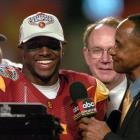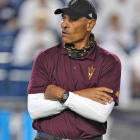DALLAS -- Add Big 12 commissioner Bob Bowlsby to the list of college football officials highlighting the divergent views of power conferences and the rest of Division I as it pertains to the way the NCAA governs.
The Big 12 hosted NCAA president Mark Emmert during Thursday’s league spring meeting session, and Bowlsby said a prominent topic during the meeting was the five major football conferences -- SEC, Big 12, Big Ten, ACC and Pac-12 -- having “the wherewithal to separate themselves from the rest of college athletics.”
The subject of a potential NCAA subdivision for the five conferences, which generate the most money and which Bowlsby says generate about 85 percent of the major NCAA championships, has engaged SEC commissioner Mike Slive, Ohio State athletics director Gene Smith and others in recent months.
At the crux of the matter is the stipend issue -- many of the big schools are ready to pay athletes, but more than 340 schools vote on the matter, and Emmert's latest push for a $2,000 stipend was rescinded.
Bowlsby said he’s not expecting the conferences to pick up their ball and play somewhere else, in part because he hasn’t heard an equitable alternative to the current NCAA setup yet.
But talk of a subdivision -- staying within the NCAA framework but having a different set of rules than the rest -- isn’t dissipating anytime soon.
“More than ever before, people are questioning whether you can mange football and field hockey with the same set of rules,” Bowlsby said.
Membership also discussed the current NCAA infrastructure that places the onus on university presidents to make major decisions in college athletics. Athletic directors and coaches want more input. The NCAA has hired a governance consultant, Jean S. Frankel, to help matters. Membership is still committed to the NCAA, Bowlsby said, but it wants more inclusion for athletic department heads who thought things would be different.
“It would be unforthright to say people aren’t concerned and frustrated with the legislative process and governance process,” Bowlsby said.
Emmert, the embattled president whose organization faces embarrassment after botching an investigation into the University of Miami, spoke with the Big 12 for about 45 minutes Thursday and is “confronting fears head on,” Bowlsby said.
“He didn’t propose any sort of magic scenario that was going to solve all of our problems,” Bowlsby said. “But he encouraged us to remain engaged or become engaged in trying to solve the problems we have.”
As Bowlsby points out, concocting a formula that satisfies all parties is a major challenge. Every option has problems based on inclusion, cost, postseason access, he said.
Big Ten commissioner Jim Delany said there are too many important athletic voices outside of the power-conference structure that shouldn’t be ignored.
Though no plan is in action for a subdivision or a breakoff, there’s too much chatter --especially from prominent college football figures -- to ignore. At least some change seems inevitable, but how much?




















